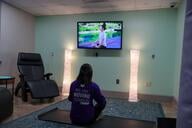You have /5 articles left.
Sign up for a free account or log in.

iStock
Universities around the country are moving students into residence halls and holding classes, but outbreaks of coronavirus, often linked to parties, continue to spread. One university decided to send students home this weekend, while others delay move-in or crack down on student behavior.
East Carolina University this weekend became the latest institution to send students home and move classes online. ECU will suspend classes today and Tuesday and hold them online thereafter. Classes began Aug. 10. Residence halls will begin move-out this week to end on Aug. 30, with exceptions for some special cases. Athletes may continue to live on campus, and there have been no changes to the athletics calendar.
The university has had 125 cumulative cases among students and staff. The move follows similar decisions from the University of North Carolina at Chapel Hill and North Carolina State University.
Other institutions are delaying move-ins or in-person classes but not sending students home yet.
The University of North Carolina at Charlotte has delayed both student move-in and the start of in-person classes. Move-in was scheduled to begin Aug. 31 with classes beginning in person on Sept. 7. Now, the university announced, classes will be online until Oct. 1. Move-in will be held Sept. 26 to 29.
Classes are set to begin today at Towson University in Maryland, but on Saturday the administration announced that instead of in-person, as planned, the first week of undergraduate courses would be held online. Move-in has been suspended but many students are already living on campus, as move-in began Aug. 13. The administration tested students and staff upon arrival and found 55 positive results for diagnostic tests taken between Aug. 19 and 20. None of the 55 individuals who tested positive are on campus, the university said, and all on-campus activities are canceled.
At the University of Minnesota, President Joan Gabel has proposed delaying student move-in at three campuses for two weeks and having students learn online for that time. The proposal comes after Deborah Birx, leader of the White House Coronavirus Task Force, recommended on a private call that universities test students upon arrival and also have the capacity for “surge testing,” if a large quantity of tests are needed on one day. Currently, the University of Minnesota plans to only test students who are symptomatic or have been exposed to COVID-19. The Board of Regents plans to hold a meeting today to consider.
Among universities that have brought students back, large parties have quickly become the kryptonite of college administrations and their reopening plans, with several outbreaks tracing back to the gatherings.
Parties have been the stated cause of new outbreaks at Central Michigan University and the University of Toledo.
Central Michigan University has reported 38 positive cases of coronavirus.
“This sort of irresponsible and reckless behavior not only puts our in-person living and learning at risk, it also puts lives at risk,” a university spokesperson told The Detroit News.
The University of Toledo has seen 27 students, including some athletes, infected with the virus. The administration is now asking students to self-quarantine if they’ve attended recent large off-campus parties.
“The plan is only going to be as good as the students’ willingness to follow it,” Toledo-Lucas County Health Commissioner Eric Zgodzinski told The Toledo Blade.
At other campuses, university administrations are trying to crack down on student partying with tactics ranging from suspension to eviction.
Syracuse University suspended 23 students after a gathering in a quad drew hundreds on Wednesday night. The administration is investigating the gathering using security footage and witness accounts.
St. Olaf College in Minnesota has suspended 17 students and placed 50 in quarantine after the students attended a large off-campus party.
“This is the kind of reckless behavior that will put an end to our in-person semester, and it must stop,” President David Anderson said in an email to students Thursday.
After pictures of students packed into bars and parties near the University of Alabama circulated through the news media last week, the university has released revised safety guidelines. All in-person student events will be canceled for 14 days, and Greek houses will be restricted to residents and those picking up grab-and-go meals.
St. Mary’s College of Maryland has barred students who participated in a large off-campus party on Aug. 15 from living on campus and participating in in-person events or classes.
“We have already seen other campuses transition to remote plans and remove students from their communities for similar actions. Off-campus house parties often play a significant role in spreading the virus. We expect more from our students,” said Shana Meyer, vice president for student affairs, in an email to students and parents.
At Northeastern University, the administration was alerted to an Instagram poll in which a number of incoming students indicated that they were planning to attend parties. When asked, the student running the poll voluntarily gave the administration the names of the 115 freshmen who said they would party, and each student and their parents received a stern letter.
“It has been brought to our attention that on a social media platform you have indicated an intent to gather in large groups and engage in parties while disregarding numerous government and university restrictions regarding safe distancing and social gatherings during the COVID-19 crisis, and encouraged others to do the same. This is unacceptable, will not be tolerated, and presents a danger to your health and the health of our community,” the letter said.
The administration said it would require the 115 students to each provide written responses acknowledging that they will abide by the student code of conduct and other guidelines, and will actively participate in “Protect the Pack,” Northeastern’s public campaign encouraging healthy behaviors.
The Arizona Board of Regents sued the anonymous owner of an Instagram account called asu_covid.parties and Facebook, the owner of Instagram, alleging that the account improperly used Arizona State University’s logos and trademarks. The account claimed to throw parties at ASU.
Instagram has deleted the account in question, though a separate account, asu_covid.parties2, appeared Sunday.
“Instagram censored us the first time but Führer crow will not keep us silent. We will rise,” the account posted in its first communication yesterday, making reference to Michael Crow, the president of ASU. The account claims it will be posting parties soon on Instagram and Snapchat and discourages students from wearing masks, getting tested or downloading the university’s tracer app. In its posts and Instagram stories, the account refers to COVID-19 as a hoax.
The account only had eight followers as of Sunday.








